-
Posts
3,924 -
Joined
Content Type
Profiles
Blogs
Forums
American Weather
Media Demo
Store
Gallery
Posts posted by Snowstorms
-
-
5 hours ago, mississaugasnow said:
@Snowstorms @michsnowfreak Even with that big push in late March YYZ is still at 6th least snowiest season on record at the airport. I don't know about you guys but to me thats going in the futile pile. 6th place has a cushion of about 2" before this winter would slip to 7th.
Not happening. Just an initial look at the models and upper air pattern would suggest winter is largely over for us. The storm this week was underwhelming and only produced snow further north and east. YYZ will likely finish at 26.3" for the season, well below our 44.5" average. This winter receives an F grade from me.
Hopefully this was our last sustained cold too, ready for some warmth and thunderstorms now.
-
@mississaugasnowWatching the Tues-Thurs storm closely right now. Still a few days out but with the lingering cold air from the high in Quebec, there could be the potential for a messy storm across the GTA. Potential is there for rain, ice pellets, and snow. Might be winter's grand finale.
-
 1
1
-
-
On 3/21/2024 at 7:39 PM, michsnowfreak said:
So not as many as I recalled. Quite a few in the 3-5" range but only 2 officially 6+ post Mar 15th since 2000.
7.2"- Apr 5/6, 2009
7.3"- Mar 21/22, 2008
I had an 8" storm Mar 25/26, 2002 where DTW only had 4.7" (huge cutoff).
For us, the two most recent late winter storms would have to be (not including today):
Apr 3/4, 2016 - 5.5"
Mat 23, 2011 - 5.0"
Our climo supports more smaller events (<3") than bigger storms after mid March.
-
 2
2
-
-
2 hours ago, mississaugasnow said:
@michsnowfreak. @SnowstormsTheres going to be some wild difference in snow totals across GTA
Pearson will end up middle ground. Looks like 6-10” east end. 4-6” Airport and 1-3” for my place and west end.
Hamilton and my place is now pretty much locked into seeing one of the worst winters snow wise ever.
Still up in the air with Pearson
I just measured 6.2" in my backyard. Great storm.
This storm will push YYZ ahead of 06-07 and 15-16, which would put it at 6th lowest ever.
If we used a combination of Toronto and North York (1840-present) then 2023-24 would be 4th lowest lol. Doesn't matter how we spin it, this winter was a monstrosity for all of us.
-
 1
1
-
-
@mississaugasnowYYZ has somehow surpassed 09-10 and 52-53 and is now sitting at 4th least snowiest on record. Friday's storm could make the difference if we surpass 06-07 or not.
Won't change anything. This was winter was total horseshit. But glad we avoided a futility winter.
-
5 hours ago, 40/70 Benchmark said:
Here are the Modoki La Nina seasons that were preceded by active ACE years.
Maybe we will manage a bit more snowfall next year, assuming a high ACE (can it be less?), but should still be mild.
Possibly a bit cooler with the warmth centered to the south, as opposed to north...like this past year. But the winter will probably be better out west again.
2008-09 and 2011-12 were second year La Nina's preceded by much stronger La Nina's the year before. So I don't know if that matters from an analog perspective. 2016-17 hardly lasted for more than 5 months and only bottomed out at -0.7. 2016-17 could be an analog depending on the strength but that's far out anyways.
-
12 hours ago, bluewave said:
Yeah, there have been many comments on the forum how this -PDO La Niña background state has been so much warmer especially during the winters than older -PDO La Niña years before 15-16. I think the record SST warming near Japan is going hand in hand with the warming in the MJO 4-7 areas. So both those features tend to promote an Aleutian ridge near the Dateline and a ridge near the Eastern US. Notice how even with such a strong El Niño this winter there was still that ridge south of the Aleutians instead of the much stronger Aleutian low typical for strong El Niños.
Great post.
There's been a lot of comments about the warmth in the last couple of winters being driven by the -PDO but I don't think so. Just a quick glance at the SST maps can tell you how atypical the current -PDO looks despite a deeply negative anomaly. I believe the period between 1998-2014 was the last time we had a true -PDO phase and it was quite reflective in the Pacific ssts. And we experienced several cold winters in that period especially from 2007-2015. Maybe a strong La Nina may shift those anomalies and also drive down Pacific SST's especially off the coast of Japan and in the WPAC. The warm Atlantic and +AMO don't help us either.
A poleward Aleutian ridge if linked with Atlantic blocking can be beneficial for the east too. It may not be a super cold pattern as the EPO would be neutral, but it would be below normal overall. If I'm not mistaken, we saw that in December 2010.
-
On 3/7/2024 at 5:41 PM, roardog said:
All the ensembles are showing strong ridging in western Canada and into Alaska in the medium range. If that’s correct, it will release unseasonably cold air into the eastern half of the US regardless of what the models actually show for temp deviations right now. The euro ensemble mean actually shows around 7 or 8 degrees below average at 850 just after day 10 in the Great Lakes. That’s impressive for an ensemble mean.
Probably won't last for more than a few days to a week. Models have been advertising a "pattern change" or "cold air" in the medium-long range all winter going back to December and it never came to fruition except for a brief 7-10 day period in mid January. Outside of that, it's been historically warm. I'm not sold on any real pattern change for us right now. Even 2015-16 had more cold periods in JFM than this winter despite an historically warm December. However, early April 2016 was quite cold.
-
On 3/2/2024 at 10:24 PM, TheClimateChanger said:
With meteorological winter in the books, here is how things shaped up in southeast Michigan.
It was the fourth warmest in the threaded record (dating to 1874-1875). It was the warmest on record at Detroit City Airport (dating to 1933-1934) and the warmest on record at Detroit Metropolitan Wayne Airport (dating to 1958-1959). Interestingly, the 36.6F mean temperature at DET [which was the official observation site from 1934-1966] would have placed second warmest in the threaded record. Last winter's value of 35.2F would have placed third [or fourth if you also included this winter].
The station thread is as follows:
Threaded record
City Airport
Detroit Metropolitan Wayne International Airport
Pretty telling and concerning 7 of the top 10 warmest winters are in the last 27 years and 5 in the last 13 alone. Although a few others did not make the top 10 for Detroit, there's several other warm winters or winters with an abnormally warm month in that 27 year span including 1998-99, 1999-00, 2005-06, 2012-13, 2019-20, and 2020-21.
Warmth is one statistic and snow is another. I'm more concerned about the warmth and its severity and longevity during the winter season than whether we end up with above average snow. Because if we continue on this trend, we won't see many snow cover days or may struggle with precip issues with every storm. The period between 2007-2015 was the only real cold period filled with snow/cold that we honestly had since the 90's. And many of the 90's winters were shit too.
-
 2
2
-
-
7 hours ago, 40/70 Benchmark said:
Early lead candidate for me is 1998-1999, which woud actually be a notable improvement over this past monstrosity.
At this point, anything will be better than this winter's monstrosity.
I'd take a repeat of 98-99. Biggest problem for me is that it was a warm winter too and I'm sick of these constant warm winters. But we had that blizzard in January 1999 that dumped 16-20" in Toronto and cued one of the snowiest 2 week periods ever in Toronto for a total of 46" in just 14 days. Kind of similar to Feb 2015 for you guys.
-
 1
1
-
-
1 hour ago, michsnowfreak said:
How far back to YYZ records go? Surprised none of those warm 1870s-80s winters weren't on the list.
1957-58 and 1965-66 locally had warm, wet Decembers followed by cold dry rest of winter. Each had less snow here than this winter and were really many weenies nightmare pattern (warm and wet to cold and dry). It's surprising that 1957-58 wasn't warmer (outside December) due to a strong Nino and many mild winters preceeding that year.
1972-73 was interesting. It was amidst one of the coldest stretches of the climate record, so I'm wondering if that made it a bit colder overall (arguably the same for 1965-66). We had enough snow to make it an avg snow season (even a tick above at the time). January was warm and snowless but Feb was cold. The first half of March was and still is the warmest on record then we got slammed with a big St Paddy's day snowstorm.
Some historic strong Ninos that were very warm winters include 1877-78, 1905-06, & 1918-19. Most areas had little snow as well (esp 1918-19).
My take is that strong Ninos are going to have other factors at play (the current weather/climate cycle of the time, Pacific, blocking, PNA, NAO, etc) but in the end, a strong El Nino is never a sign for a good winter, at least in the Great Lakes.
YYZ only goes back to 1938. Here's the top 10 for Toronto going back to 1840. I used Toronto till the mid 1950s and YYZ thereafter because of the continued industrial revolution skewing anomalies. As of now 1931-32 holds the title for us. I guess you could make an argument that those pre 1955 winters if they happened today with all the UHI, they would be a lot warmer. Therefore, for that time, which is considered to be a much cooler time globally, those winters were incredibly warm vs normal.
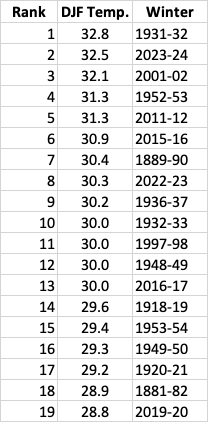
We lucked out in 1965-66 with 27" in January but snowfall outside of January was abysmal. And 1957-58 was shit here too, snow wise. Temperature wise both winters finished slightly above average but not by much. We finished near average for 1972-73 too, primarily thanks to a snowy November and December where 60% of our winter snow fell in those 2 months.
I made a post in the other thread about strong Nino's. Every strong/super Nino since 1982-83 has been an absolute blowtorch across North America. Quite the opposite with other notable strong Nino's like 1972-73, 1965-66, and 1957-58. It seems like 1982-83 was the tipping point. Though aside from the temperature anomalies, one thing remains constant. They were all largely snowless for the entire region. We seem to fair much better and snowier with strong La Nina's. Of the majority of YYZ's top 10 snowiest winters, most are strong Nina's. I'd assume it's the same for Detroit.
-
41 minutes ago, bluewave said:
It didn’t even take 10 years to surpass the CONUS warm record set in 15-16.
Where does 2022-23 and 2016-17 stand on the rankings?
Locally, 2023-24 was the warmest on record here in Toronto at YYZ. Though records at YYZ only go back to 1938, I'm positive 2023-24 is in the top 5 or top 3 if I looked at all the records that went back to 1840. Of the top 8 warmest on record at YYZ, 5 are since 2015-16 which include 2015-16, 2016-17, 2019-20, 2022-23, and 2023-24. Fucked up lol.
I know you make a lot of reference to 2015-16 so I wonder if this is just a hangover from that super Nino on the globe and global oceans or has the warming simply accelerated. The amount of warmth and warm winters we've seen in the last 8 years is absurd. We saw a similar thing with the 1997-98 super Nino. From 1997-2007, we only saw 2 cold winters across the continent (2000-01 and 2002-03) and one near average (2003-04). Although we experienced the multi-year Nina (1998-2001), it may have not been enough to counter the warmth that built up from the 3 strong Nino's vs one strong Nina from 1986-1998. Until the 2007-08 strong La Nina did we enter a period of colder winters from 2007-2015 and only really experienced one warm winter (2011-12). I'm talking about all of North America not locally.
I don't think the -PDO is responsible for any of the warmth. The PDO was predominately negative between 2007 and 2015 and we experienced 90% cold winters. You made a post about strong Nino's stepping up global temperatures and I think it maybe partially to blame for the recent increase in warm winters. The 2015-16 super Nino may have greatly impacted ocean temperatures enhancing the +AMO and ultimately the SER which has been on steroids since. It may have also altered the usual -PDO, as even though numbers may say otherwise, only 2020-21, and 2021-22 looked like a full fledged -PDO across the Pacific (like 2007-2015 did). One simple look at the current SST map can tell you that despite the deeply negative anomaly. One can say the same thing about the MEI values hardly cracking moderate status despite a super Nino ONI value last tri-month.
Basically we need a 2007-08 or 2010-11 type of La Nina to cool the oceans down. I think.
-
This winter (DJF) is officially the warmest on record at YYZ with a mean temperature of 32.5 (0.3C) and 0.5 ahead of the previous record holder (2001-02). Other top 6 winters are 2011-12, 2015-16, 2022-23, 1997-98, 2016-17, and 2019-20. 5 of the top 8 have been since 2015-16 which is fucked. @mississaugasnow
Either the warming has exponentially accelerated or this is just a result of the 2015-16 super nino hangover on the globe. Hard to say right now but facts are facts. Winters are getting warmer. Only 2013-14 and 2014-15 are the two recent winters to be in the top 12 coldest at YYZ. Everything else is pre 1982.
Snow is nothing more than just a byproduct of the existing pattern. It takes just one or two storms or a "snowy" week to change the outcome between a snowless and snowier winter. We saw that perfectly this winter. The warmer oceans maybe playing a role in enhancing storms. But if we continue on this warming trend, at some point, snow will play catch up and we'll have to constantly deal with marginal temperatures and mixing.
1972-73, a key analog some have used for this winter, was considerably colder across the entire continent. And some other notable strong Nino's (1965-66 or 1957-58) were also considerably colder. The 1982-83 super nino changed the game and every strong/super Nino since then has been incredibly warm.
-
 1
1
-
-
GFS continues to look snowless. Would be remarkable if we go the entire rest of March and April without any winter storm. i don't think there is any winter that went snowless after mid Jan and that too coming off a snowless December. Outside of a weak clipper in mid Feb, it's been incredibly warm and snowless. @mississaugasnow Pretty much unheard of at our latitude.
-
 1
1
-
-
17 minutes ago, michsnowfreak said:
Powerball is correct. Many cities in this sub had a record stretch of snow from about 2008-2015, and also a few great winters pre-2008 as well. As someone who is a local climate "expert" you always get somewhat of a balancing out, even if not fully. Averages do sway up and down over time, but we were far above our climo from the mid-00s to mid-10s.
All that said, what I CAN tell you regarding ENSO is that most of the enso states (3 strengths of nino, neutral, 3 strengths of nina) have a higher probability of a certain type of winter, but usually with a few exceptions. The ONLY state that is a pretty much guarantee is what we had this year, a strong Nino. Some are better than others, but NOT ONCE have we had a good winter in a strong Nino, and this dates back to the 1870s. You can bank on a warm winter overall, and just hope that you get a few periods of fun. Meanwhile, a weak El Nino is often a cold and snowy winter here.
A switch from El Nino to La Nina is often welcome news for our region. La Ninas often, though not always, are snowy, stormy winters. They also have a tendancy to be more front-loaded, though again, this is not always the case.
I do agree we had a nice stretch of cold/snowy winters for a period of time between 2008-2015 and a few others since the start of the century (2000-01, 2002-03, and 2004-05).
But the severity of those cold winters don't compare to the severity of warm winters we've experienced since the late 90's and I'm not just talking locally but nationally. 2023-24 is about to be the warmest winter on record across the nation and is on the heels of other recent warm winters like 2022-23, 2019-20, 2016-17, 2015-16, 2011-12, 2005-06, etc. All of these winters are different ENSO types too.
Maybe certain locales may not be breaking warm records but in broader context, it is historic given the shear number, longevity, and severity of warm winters. It isn't always about the records but rather the continuing (+) anomalies.
If trends continue, at some point, snow will catch up. Can't constantly have marginal snow events as our climo should be and has supported colder snow.
-
4 minutes ago, nwohweather said:
Can't agree here. It'd be nice to see more legitimate snow chances, but it's been very sunny which is certainly a welcome change to the brutal harshness winter can have. Warm & cloudy would be absolutely brutal, I'm glad we've avoided that
December till mid Jan was cloudy and warm. That changed since late January when the omega block set up and skies cleared up. A nice change from where we started and what we've experienced over the last few years. Warm and cloudy is just ugly.
-
@mississaugasnow As of yesterday YYZ is at 0.1C for DJF making it the warmest winter on record (since 1938). The final 9 days will likely seal the deal with the impending warm up.
Of the top 5 warmest winters on record at YYZ, all 5 have occurred since 2001-02 with 4/5 since 2011-12. And 9 out of the top 10 warmest have occurred since 1998. That's fucked up. You can only ascertain a portion of the warming due to UHI, but the rest of it is climate change. Kind of scary how fast winters are warming.
If we continue on this trend, at some point, snow will play catch up. We saw that last winter and 2019-20 with all the marginal snow events, but this winter kind of exposed that more. It's only a matter of time. Hope nature finds its equilibrium and things shift.
-
 1
1
-
-
8 minutes ago, DocATL said:
So last winter was a Nina and Chicago hardly had any snow. This year in a Nino we get two weeks of winter. Not sure what’s normal at this point.
.This winter sucks.
2019-20 we had a neutral and it was also warm.
-
6 hours ago, donsutherland1 said:
LaGuardia: October 1939
Newark: January 1893
Wow, I find it interesting Toronto began recording in 1840.
-
 2
2
-
-
19 minutes ago, RCNYILWX said:
Unremarkable locally with 3 days in the 60s and 4 days in the 50s, but enough to wipe out the negative anomalies from the cold and snowy first half of the month. The warmth was more extreme east of here.
Sent from my SM-G998U using Tapatalk
Quite the opposite here. We had a total of 5 days over 50, which in itself is historic for February for our area.
It wiped all the negative anomalies from the first 14 days here too. If February 2018 finished on Feb 14, it would've finished 2 degrees below average. Quite the flip.
-
1 hour ago, bluewave said:
That’s why Lonnie Quinn got the intermediate measurement which was higher. Add this up over a complete season and we can see how the official totals at NYC are lower than the surrounding stations. It’s also how that artificial under 1” record ran so long only at NYC and not any other local stations.
https://www.cbsnews.com/newyork/news/biggest-snow-accumulation-totals-around-n-y-n-j-and-conn/- Central Park: 3.2 inches officially, 3.9 inches as measured by CBS New York's Lonnie Quinn
Number of Consecutive Days Snowfall < 1
for NY CITY CENTRAL PARK, NY
Click column heading to sort ascending, click again to sort descending.RankRun LengthEnding Date1 701 2024-01-15 2 383 1998-03-21 3 381 1955-02-01
Number of Consecutive Days Snowfall < 1
for LAGUARDIA AIRPORT, NY
Click column heading to sort ascending, click again to sort descending.RankRun LengthEnding Date1 642 1973-12-16 2 386 1992-03-18 3 383 1998-03-21 4 378 2023-02-26
Number of Consecutive Days Snowfall < 1
for NEWARK LIBERTY INTL AP, NJ
Click column heading to sort ascending, click again to sort descending.RankRun LengthEnding Date1 661 1973-12-15 2 378 2023-02-26 3 363 1955-01-14 4 351 1992-02-12
Number of Consecutive Days Snowfall < 1
for JFK INTERNATIONAL AIRPORT, NY
Click column heading to sort ascending, click again to sort descending.RankRun LengthEnding Date1 660 1974-01-03 2 378 2023-02-26 3 363 1989-01-05 We have the exact same issue here in Toronto. They lowball every storm at the airport location, which is our main reporting station. It's really problematic. For example, during the Feb. 2013 storm, YYZ only recorded 8.6" whereas every other station recorded 15-20".
YYZ became operational in 1938. 2007-08 was officially about to be the snowiest winter on record at YYZ but they lowballed the March storm by 8" and we fell short of the record by 5" lol.
-
 3
3
-
9 hours ago, LibertyBell said:
2006-07 started as the warmest winter on record though and only flipped in February
That was a colder stretch but the really cold stretch started with 2002-03.
we took a break from the cold in a few of those years. between that year and 2014-15
2006-07, 2007-08, 2011-12
I agree. 2006-07 started off incredibly warm and the Feb cold wasn't enough to erase the warmth. 2007-08 may have been warm for us out east but it was cold across the plains and further west.
I'd say it started with 2000-01 as it was quite cold. 2005-06 and 2012-13 were also warm too. 9/15 winters between 2000 and 2015 were cold whereas in the last 8, only 1-2 winters were cold. Quite the flip.
-
 1
1
-
-
1 hour ago, RCNYILWX said:
Late February 2017. It was the 3rd warmest February on record for Chicago. 1998, a super Niño, is second warmest.
Where does the mid-late February 2018 warm up stand?
-
6 hours ago, Frog Town said:
Late February is looking very late '98ish, another very strong Nino year.
I agree. '83, '98, and '16 all had similar type of March patterns.
As @michsnowfreakmentioned all three had a cool down sometime mid-late March. Although in 2016 it happened in early April. But no guarantees it will happen this year. This winter has been on life support since it started.


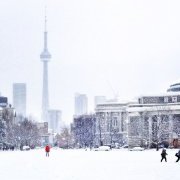

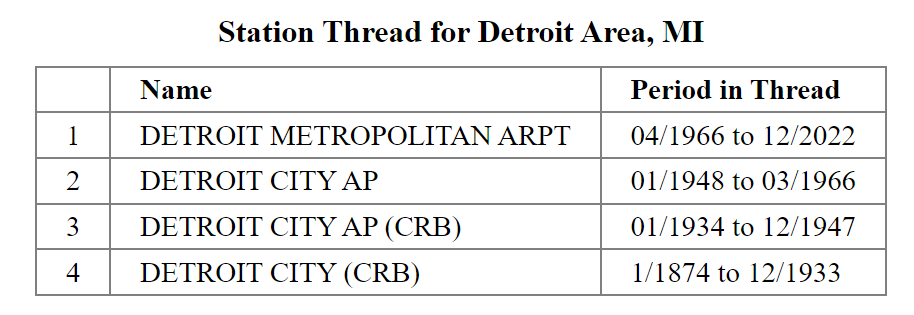
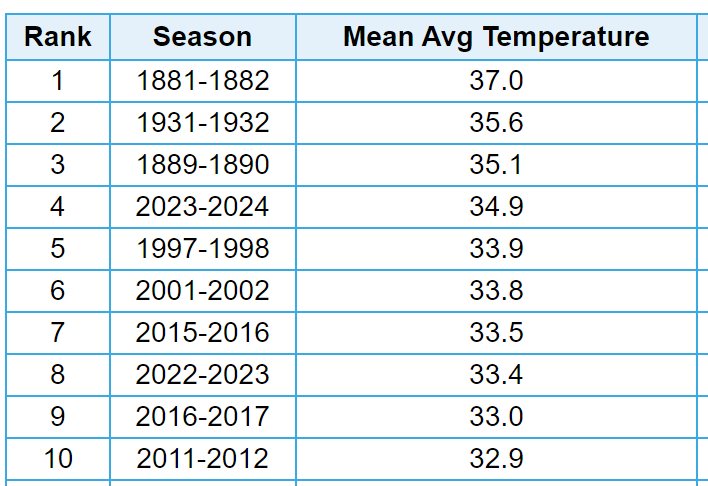
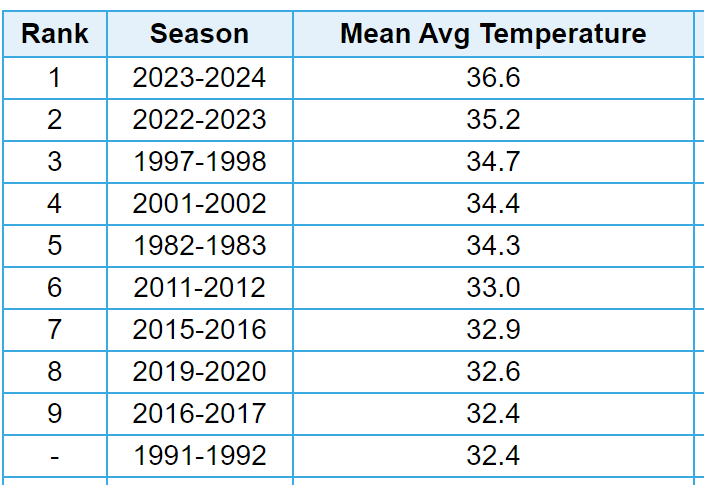
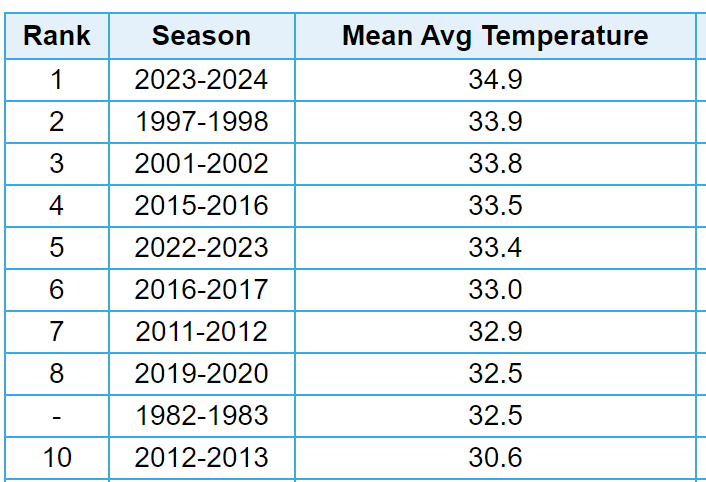
April 2024 General Discussion
in Lakes/Ohio Valley
Posted
7th least snowiest on record. Here's the top 10 going back to 1840. Note I used YYZ from 1955-onwards.